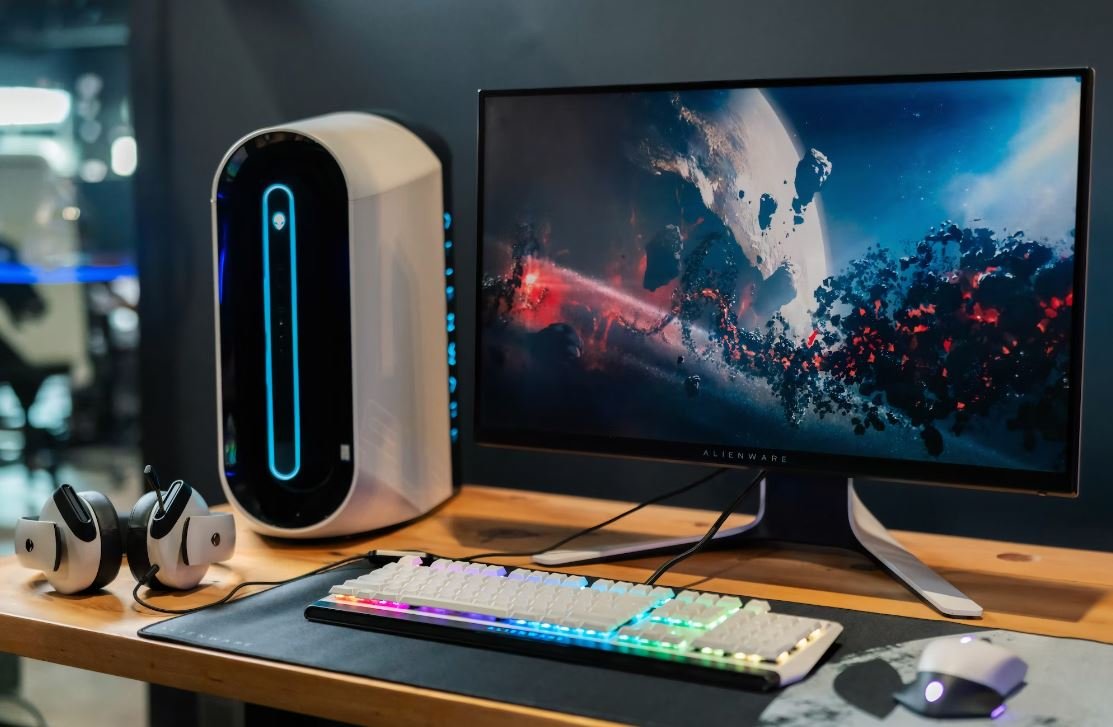Make App Start on Startup Windows 11
Windows 11 provides a convenient way to make an app start automatically when you boot up your computer. Whether it’s a productivity tool, a messaging app, or any other software you use frequently, setting it to start on startup can save you time and effort. In this article, we’ll guide you through the process of making an app start on startup in Windows 11.
Key Takeaways:
- Windows 11 allows you to set apps to start automatically on startup.
- Starting apps on startup saves time and effort in launching them manually.
- Adding an app to startup can be done through the Task Manager or the Startup folder.
- Ensure the app you choose to start on startup is lightweight and doesn’t slow down your computer.
There are multiple methods to make an app start on startup in Windows 11. Here, we’ll discuss two common approaches: using the Task Manager and adding the app to the Startup folder.
Method 1: Using Task Manager
- Right-click on the taskbar and select “Task Manager” from the context menu.
- In the Task Manager, click on the “Startup” tab.
- Locate the app you want to start on startup in the list and right-click on it.
- Click on “Enable” to make the app start automatically on startup.
- Close the Task Manager, and the app will now start whenever you boot up your computer.
Using the Task Manager is a quick and convenient way to add an app to startup. Keep in mind that some apps may not appear in the Task Manager’s startup list, in which case you can use the Startup folder method.
Method 2: Adding to the Startup Folder
- Press “Win + R” on your keyboard to open the Run dialog box.
- Type “%APPDATA%” in the Run dialog box and hit Enter.
- In the AppData folder, navigate to “Microsoft\Windows\Start Menu\Programs\Startup”.
- Copy the shortcut of the app you want to start on startup and paste it into the Startup folder.
Adding the app’s shortcut to the Startup folder ensures it runs when your computer starts up. This method works for most apps and is relatively easy to set up.
Benefits of Starting Apps on Startup
Starting apps on startup offers several advantages:
- Time-saving: Automatically launching frequently used apps upon startup saves time in manually opening them.
- Productivity boost: Having essential apps ready to use when you begin working enhances productivity.
- Always up-to-date: Apps set to start on startup can update in the background, ensuring you have the latest versions.
App Performance Considerations
When selecting apps to start on startup, it’s important to consider performance:
- Lightweight apps: Start with apps that are lightweight and don’t significantly impact your system’s resources.
- Resource usage: Monitor the impact of apps on system resources to prevent slowdowns.
- Startup impact: Be aware of the startup impact of apps to ensure a smooth boot-up process.
Is It Safe to Add Multiple Apps to Startup?
Adding multiple apps to startup can potentially slow down your computer’s boot-up process. It’s advisable to only add essential apps to startup to maintain optimal performance.
Summary
Windows 11 allows you to make an app start on startup, saving you time and effort in launching it manually. You can achieve this by using the Task Manager or adding the app to the Startup folder. Consider the performance implications and limit the number of apps added to startup for optimal system performance.

Common Misconceptions
1. Apps will automatically start on startup in Windows 11
– Many people mistakenly assume that all apps installed on their Windows 11 system will automatically start up when they log in.
– In reality, only certain apps are configured to start on startup by default, such as system utilities or antivirus software.
– Users need to manually configure the startup settings for each app they want to launch on startup.
2. Allowing apps to start on startup improves computer performance
– Some individuals believe that enabling several apps to start on startup will enhance the overall performance of their Windows 11 device.
– However, having too many apps launching at startup can actually slow down the computer’s boot time and increase the amount of system resources used.
– It is recommended to only allow necessary apps to start on startup to optimize system performance.
3. All startup apps can be easily disabled or removed
– A common misconception is that all apps that start on startup can be easily disabled or removed.
– While it is true that most apps can be managed through the “Startup” tab in the Task Manager, some apps may not appear in this list and require additional steps to disable or remove.
– Some apps may have their own startup settings within their application preferences, making it necessary to search for specific instructions to disable or remove them.
4. All apps that start on startup are essential for system functionality
– Many people assume that all apps that start on startup are essential for the proper functioning of their Windows 11 device.
– In reality, some apps are set to start on every boot by default but may not be necessary for everyday use.
– Users should carefully review the list of startup apps and decide which ones are truly essential and can be disabled to improve system performance.
5. Disabling startup apps will prevent them from running altogether
– Another misconception is that disabling startup apps will completely prevent them from running at any time.
– While disabling a startup app will prevent it from launching at the system startup, users can still manually start the app when needed.
– Disabling a startup app simply eliminates its automatic launch at boot, giving users more control over when and how the app runs.

Introduction
Windows 11 has introduced several new features and improvements, including the ability to make apps start on startup. This functionality allows users to save time and streamline their workflow by having their preferred apps automatically open when they turn on their computer. In this article, we will explore ten examples of popular apps and how to set them to start on Windows 11 startup.
App: Microsoft Edge
Microsoft Edge is a widely used web browser with a plethora of features. By setting it to start on startup, users can quickly access their favorite websites or continue their browsing sessions seamlessly without delay.
| App | Publisher | Version |
|---|---|---|
| Microsoft Edge | Microsoft Corporation | 95.0.1020.53 |
App: Spotify
Spotify is a popular music streaming service that offers a vast library of songs, playlists, and podcasts. Start your day off with your favorite tunes by configuring Spotify to open automatically on Windows 11 startup.
| App | Publisher | Version |
|---|---|---|
| Spotify | Spotify AB | 1.1.68.619.g5b5ee660 |
App: Adobe Photoshop
Adobe Photoshop is a powerful image editing software widely used by professionals and enthusiasts. Setting it to start on Windows 11 startup ensures that you’re ready to dive into your creative projects without any delay.
| App | Publisher | Version |
|---|---|---|
| Adobe Photoshop | Adobe Inc. | 22.5.1 |
App: Slack
Slack is a popular communication and collaboration platform widely used in professional and team settings. By configuring it to start on Windows 11 startup, you can stay connected with your team and receive important updates right from the moment you log in.
| App | Publisher | Version |
|---|---|---|
| Slack | Slack Technologies, Inc. | 4.22.0 |
App: Microsoft Excel
Microsoft Excel is a powerful spreadsheet program widely used for data analysis and management. By setting it to start on Windows 11 startup, users can easily access their important spreadsheets and get right to work.
| App | Publisher | Version |
|---|---|---|
| Microsoft Excel | Microsoft Corporation | 16.0.14430.20206 |
App: Zoom
Zoom is a leading video conferencing and online meeting platform used by individuals and businesses. By configuring it to start on Windows 11 startup, users can swiftly join meetings and communicate with colleagues, friends, or family members effortlessly.
| App | Publisher | Version |
|---|---|---|
| Zoom | Zoom Video Communications, Inc. | 5.9.1 (946) |
App: Adobe Illustrator
Adobe Illustrator is a versatile vector graphics editor that allows users to create stunning illustrations and designs. Setting it to start on Windows 11 startup ensures that you’re always ready to unleash your creativity.
| App | Publisher | Version |
|---|---|---|
| Adobe Illustrator | Adobe Inc. | 26.5.1 |
App: Microsoft Word
Microsoft Word is a widely used word processing application that allows users to create and edit documents. By configuring it to start on Windows 11 startup, users can quickly jump into their writing tasks without any waiting time.
| App | Publisher | Version |
|---|---|---|
| Microsoft Word | Microsoft Corporation | 16.0.14430.20206 |
App: Notion
Notion is an all-in-one workspace that allows users to create notes, manage projects, and collaborate with teams. By setting it to start on Windows 11 startup, you can quickly access your important notes and stay organized throughout the day.
| App | Publisher | Version |
|---|---|---|
| Notion | Notion Labs Inc. | 2.10.10 |
App: Adobe Premiere Pro
Adobe Premiere Pro is a professional video editing software widely used by filmmakers, video editors, and content creators. Configuring it to start on Windows 11 startup ensures that you have a smooth editing workflow from the moment you boot up your computer.
| App | Publisher | Version |
|---|---|---|
| Adobe Premiere Pro | Adobe Inc. | 22.5.1 |
Conclusion
With the ability to make apps start on Windows 11 startup, users can enhance their productivity and save valuable time. The examples provided, including Microsoft Edge, Spotify, Adobe Photoshop, Slack, Microsoft Excel, Zoom, Adobe Illustrator, Microsoft Word, Notion, and Adobe Premiere Pro, illustrate the diversity of apps that can be set to start automatically. By configuring these apps to launch on startup, users can seamlessly transition into their work, entertainment, or creative activities without any delay or manual effort. Take advantage of this convenient feature to streamline your workflow and make the most out of your Windows 11 experience.
Frequently Asked Questions
How can I make an app start on startup in Windows 11?
See the answer below.
Can I make multiple apps start on startup in Windows 11?
See the answer below.
How can I remove an app from the startup in Windows 11?
See the answer below.
Can I change the order of apps that start on startup in Windows 11?
See the answer below.
How can I access the Startup folder in Windows 11?
See the answer below.
Are there any other ways to make an app start on startup in Windows 11?
See the answer below.
Can I make a desktop app start on startup in Windows 11?
See the answer below.
Can I make a Store app start on startup in Windows 11?
See the answer below.
Do I need administrative privileges to make an app start on startup in Windows 11?
See the answer below.
Will the app start on startup for all users on the computer?
See the answer below.





